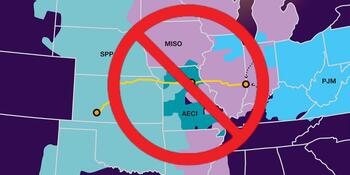
In May, Michael Polsky, the CEO of Chicago-based Invenergy, appeared on Fox Business to announce that his company was awarding some $1.7 billion in contracts to build the long-delayed Grain Belt Express transmission project. In an interview with Maria Bartiromo, Polsky claimed the 780-mile high-voltage project would "create 22,000 jobs along the way between transmission and generation.”
Polsky (net worth: $2.5 billion) went on to serve up more spin than Rafael Nadal. He claimed the project “will be unleashing American energy. We will be creating energy independence in a way.”
Here’s a tip: whenever you hear anyone — particularly a hype man like Polsky — promise energy independence, grab your wallet.
Invenergy, which is majority owned by the Canadian firm CDPQ, also claims the project will result in “$52 billion in energy cost savings” and that the transmission project is “private sector-led and market-driven.” Polsky, who recently announced a $75 million gift to the World Resources Institute so it can help “accelerate...the global energy transition,” concluded his CNBC appearance by saying his company needs “clarity” from the Trump administration. “We need to know what the rules” will be.
Polsky neglected to mention that if his project gets built, it will saddle ratepayers with about $500 million in costs to integrate the power it will be delivering into grids on the eastern end of the line. In other words, Invenergy wants to build a merchant high-voltage transmission line and force its way onto the US electric grid. But it doesn’t want to pay any of the costs that its project will impose on the system. Furthermore, Grain Belt Express has faced fierce opposition in Missouri for more than a decade. Earlier this month, Missouri Attorney General Andrew Bailey announced a civil investigation into Invenergy for its “misleading claims and a track record of dishonesty” about the project.
But I digress.
Last week, the Department of Energy gave Polsky some high-amperage clarity from the Trump administration when it canceled a $4.9 billion loan guarantee for the Grain Belt Express that the agency’s Loan Programs Office made last November in the waning days of the Biden administration.
The DOE said it killed the loan deal “to ensure more responsible stewardship of taxpayer resources.”
The cancellation of the DOE’s guarantee will almost certainly kill the Grain Belt Express. (Invenergy claims it still plans to build the project. I wouldn’t bet on that.) The demise of that project is only one of many high-voltage projects around the world that are being slowed or stopped by local opposition, soaring costs, and permitting delays.
Read the rest of this piece at: Robert Bryce Substack.
Robert Bryce is a Texas-based author, journalist, film producer, and podcaster. His articles have appeared in a myriad of publications including the Wall Street Journal, New York Times, Forbes, Time, Austin Chronicle, and Sydney Morning Herald.
Photo: The Grain Belt Express project aimed to carry wind-generated electricity from Kansas to the Indiana-Illinois border. Map credit: grainbeltexpress.com












